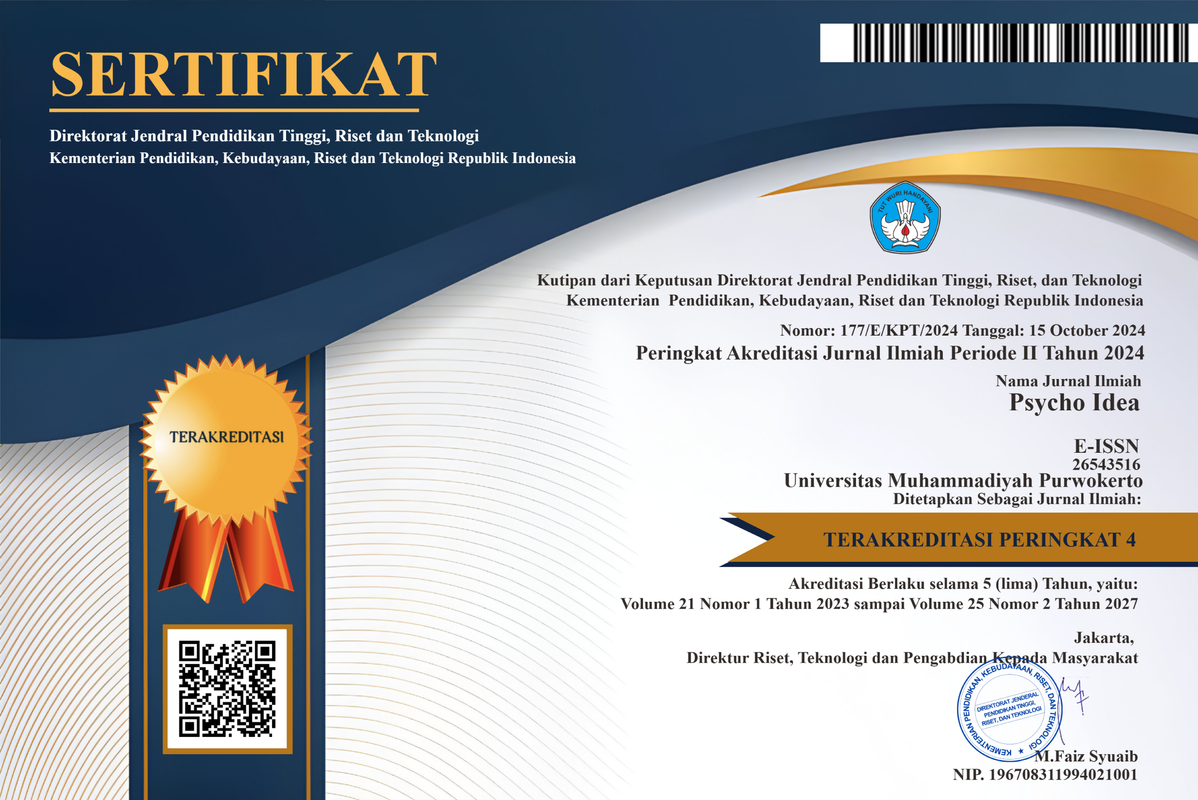STUDI DESKRIPTIF TENTANG KEMAMPUAN PEMECAHAN MASALAH PADA PESERTA DIDIK KELAS VIII SMP NEGERI I BATURRADEN TAHUN AJARAN 2011/2012
DOI:
https://doi.org/10.30595/psychoidea.v12i1.519Abstract
Penelitian ini bertujuan untuk mendeskripsikan “Kemampuan Pemecahan Masalah Peserta Didik Kelas VIII Di SMP Negeri 1 Baturaden. Populasi dalam penelitian ini sebanyak 112 peserta didik. Pengumpulan data menggunakan skala kemampuan pemecahan masalah. Deskripsi hasil penelitiannya adalah, 18,75% peserta didik memiliki kemampuan pemecahan masalah, mampu untuk bersikap hati-hati, disiplin, sistematik dan tidak menghindar dari masalah, 64,29%, cukup mampu untuk bersikap hati-hati, disiplin sistematik dan tidak menghindar dari masalah, dan 16,96% tidak mampu untuk bersikap hati-hati, disiplin sistematik dan tidak menghindar dari masalah. Kata kunci : kemampuan, pemecahan masalah, peserta didik.References
Fitriyanti. 2009. Pengaruh Penggunaan Metode Pemecahan Masalah Terhadap
Kemampuan Berpikir Rasional Siswa.
http://[email protected]. Diakses 25 Maret 2012.
Pramana.B.2006. Probem Solving. http://.sarengbudi.web.id/wpcontent/uploads/ problem-solving.doc. Diakses 05 Maret 2012.
Rakhmat, J. 2003 Psikologi Komunikasi. Bandung : PT. Remaja Rosda karya Offset.
Sarwi, L .2009. Penerapan Strategi Kooperatif Dan Pemecahan Masalah Pada Konsep Gelombamg Untuk Mengembangkan Ketrampilan Berfikir Kritis http://.id.www.journal.Unnes.ac.id. Diakses 05Maret 2012.
Setianingsih, E, dkk.(2006) . Hubungan Antara Penyesuaian Sosial Dan Kemampuan Menyelesaikan Masalah Dengan Kecenderungan Perilaku Delinkuen Pada Remaja. http://.id.www.jurnalpsikologi.Undip.com. Diakses 10 Januari 2012.
Solso dan Maclin. 2007.Psikologi Kognitif . Jakarta : Erlangga.
Stein dan Book. 2002. Ledakan IQ: 15 Prinsip Dasar Kecerdasan Emosional Meraih Sukses.Bandung : Kafia.
Sugiyono.2009. Statisk Untuk Penelitian. Bandung : CV.Alfabeta.
Williamson.2005. Problem And Solution. . http://.id.www.e-psikologi.com. Diakses Tanggal 10 September 2011.
Yusuf, S. 2011. Psikologi Perkembangan Anak & Remaja. Bandung: PT. Remaja Rosdakarya.
Downloads
Published
Issue
Section
License
Authors published in this journal agree to the following terms:
- The copyright of each article is retained by the author (s) without restrictions
- The journal allows the author(s) to retain publishing rights without restrictions
- The author grants the journal the first publication rights with the work simultaneously licensed under the Creative Commons Attribution License, allowing others to share the work with an acknowledgment of authorship and the initial publication in this journal.
- Authors may enter into separate additional contractual agreements for the non-exclusive distribution of published journal versions of the work (for example, posting them to institutional repositories or publishing them in a book), with acknowledgment of their initial publication in this journal
- Authors are permitted and encouraged to post their work online (For example in the Institutional Repository or on their website) before and during the submission process, as this can lead to productive exchanges, as well as earlier and larger citations of published work
- Articles and all related material published are distributed under a Creative Commons Attribution-4.0 International Public License (CC - BY 4.0).
License
Psycho Idea is licensed under a Creative Commons Attribution- 4.0 International Public License (CC - BY 4.0).
You are free to :
Share — copy and redistribute the material in any medium or format
Adapt — remix, transform, and build upon the material for any purpose, even commercially











